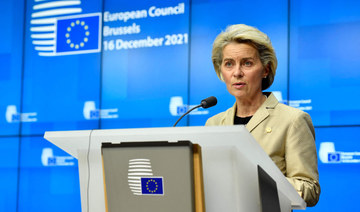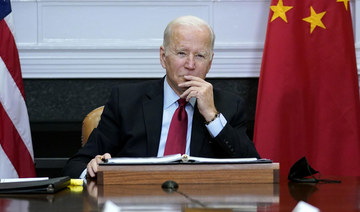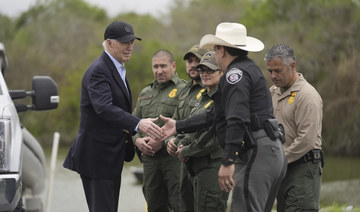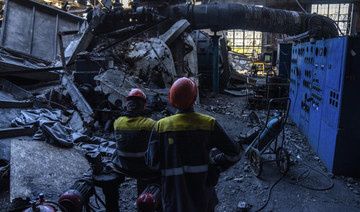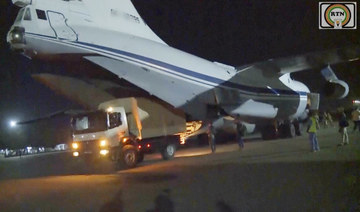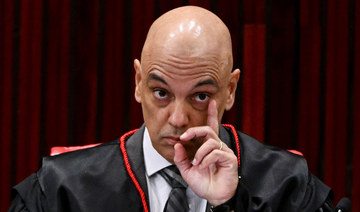MOSCOW: Russia on Friday published draft security demands that NATO deny membership to Ukraine and other former Soviet countries and roll back the alliance’s military deployments in Central and Eastern Europe — bold ultimatums that are almost certain to be rejected by the US and its allies.
The proposals, which were submitted to the US and its allies earlier this week, also call for a ban on sending US and Russian warships and aircraft to areas from where they can strike each other’s territory, along with a halt to NATO military drills near Russia.
The demand for a written guarantee that Ukraine won’t be offered membership already has been rejected by the West, which said Moscow doesn’t have a say in NATO’s enlargement.
NATO’s secretary-general emphasized Friday that any security talks with Moscow would need to take into account NATO concerns and involve Ukraine and other partners. The White House similarly said it’s discussing the proposals with US allies and partners, but noted that all countries have the right to determine their future without outside interference.
The publication of the demands — contained in a proposed Russia-US security treaty and a security agreement between Moscow and NATO — comes amid soaring tensions over a Russian troop buildup near Ukraine that has raised fears of an invasion. Moscow has denied it has plans to attack its neighbor but wants legal guarantees precluding NATO expansion and deploying weapons there.
Deputy Foreign Minister Sergei Ryabkov said Russia’s relations with the US and NATO have approached a “dangerous point,” noting that alliance deployments and drills near Russia have raised “unacceptable” threats to its security.
Moscow wants the US to start talks immediately on the proposals in Geneva, he told reporters.
NATO Secretary-General Jens Stoltenberg said the alliance had received the Russian documents, and noted that any dialogue with Moscow “would also need to address NATO’s concerns about Russia’s actions, be based on core principles and documents of European security, and take place in consultation with NATO’s European partners, such as Ukraine.”
He added that the 30 NATO countries “have made clear that should Russia take concrete steps to reduce tensions, we are prepared to work on strengthening confidence building measures.”
White House national security adviser Jake Sullivan said the administration is ready to discuss Moscow’s concerns about NATO in talks with Russian officials, but emphasized that Washington is committed to the “principle of nothing about you without you” in shaping policy that impacts European allies.
“We’re approaching the broader question of diplomacy with Russia from the point of view that ... meaningful progress at the negotiating table, of course, will have to take place in a context of de-escalation rather than escalation,” Sullivan said at the event hosted by the Council on Foreign Relations. He added “that it’s very difficult to see agreements getting consummated if we’re continuing to see an escalatory cycle.”
While US intelligence has determined that Russian President Vladimir Putin has made plans for a potential further invasion of Ukraine in early 2022, Sullivan said the US still does not know whether he has decided to move forward.
White House press secretary Jen Psaki noted that strategic security talks with Moscow go back decades, saying that “there’s no reason we can’t do that moving forward to reduce instability, but we’re going to do that in partnership and coordination with our European allies and partners.”
”We will not compromise the key principles on which European security is built, including that all countries have the right to decide their own future and foreign policy free from the outside interference,” Psaki said.
Moscow’s draft also calls for efforts to reduce the risk of incidents involving Russia and NATO warships and aircraft, primarily in the Baltic and the Black seas, increase the transparency of military drills and other confidence-building measures.
A senior US official said some of the Russian proposals are part of an arms control agenda between Moscow and Washington, while some other issues, such as transparency and deconfliction, concern all 57 members of the Organization for Security and Cooperation in Europe, including Ukraine and Georgia.
The official, who briefed reporters on the condition of anonymity in order to talk about the proposals, said the US is looking at how to engage every country whose interests are affected in prospective talks on European security issues and will respond to Moscow sometime next week with concrete proposals after consulting with the allies.
President Vladimir Putin raised the demand for security guarantees in last week’s video call with US President Joe Biden. During the conversation, Biden voiced concern about a buildup of Russian troops near Ukraine and warned him that Russia would face “severe consequences” if Moscow attacked its neighbor.
Russia annexed Ukraine’s Crimean Peninsula in 2014 and shortly after cast its support behind a separatist rebellion in the country’s east. More than seven years of fighting has killed over 14,000 people and devastated Ukraine’s industrial heartland, known as the Donbas.
The Russian demands would oblige Washington and its allies to pledge to halt NATO’s eastward expansion to include other ex-Soviet republics and rescind a 2008 promise of membership to Ukraine and Georgia. The alliance already has firmly rejected that demand from Moscow.
Moscow’s documents also would preclude the US and other NATO allies from conducting any military activities in Ukraine, other countries of Eastern Europe and ex-Soviet republics in the Caucasus and in Central Asia.
The Ukrainian Foreign Ministry commented on Moscow’s proposals by emphasizing that it’s up to the alliance and Ukraine to discuss NATO membership prospects and its military cooperation with other countries.
“The Russian aggression and the current Russian escalation along the Ukrainian border and on the occupied territories is now the main problem for the Euro-Atlantic security,” said its spokesman Oleg Nikolenko.
The Russian proposal also ups the ante by putting a new demand to roll back NATO military deployments in Central and Eastern Europe, stating that the parties agree not to send any troops to areas where they hadn’t been present in 1997 — before NATO’s eastward expansion started — except for exceptional situations of mutual consent.
Poland, Hungary and the Czech Republic joined NATO in 1999, followed in 2004 by Bulgaria, Romania, Slovakia, Slovenia and the former Soviet republics of Estonia, Latvia and Lithuania. In the following years, Albania, Croatia, Montenegro and North Macedonia also became members, bringing NATO membership to 30 nations.
The draft proposals contain a ban on the deployment of US and Russian warships and aircraft to “areas where they can strike targets on the territory of the other party.”
Moscow has long complained about patrol flights by US strategic bombers near Russia’s borders and the deployment of US and NATO warships to the Black Sea, describing them as destabilizing and provocative.
Russia’s draft envisages a pledge not to station intermediate-range missiles in areas where they can strike the other party’s territory, a clause that follows the US and Russian withdrawal from a Cold War-era pact banning such weapons.
The Russian draft also calls for a ban on the deployment of US and Russian nuclear weapons on the territory of other countries — a repeat of Moscow’s longtime push for the US to withdraw its nuclear weapons from Europe.
Dmitri Trenin, the director of the Carnegie Moscow Center, noted that the publication of the Russian demands signals that the Kremlin considers their acceptance by the West unlikely.
“This logically means that Russia will have to assure its security single-handedly” using military-technical means, he said on Twitter.
Russia sets out tough demands for security pact with NATO
https://arab.news/p6xgp
Russia sets out tough demands for security pact with NATO

- Deputy Foreign Minister Sergei Ryabkov said Russia’s relations with the US and NATO have approached a “dangerous point,” noting that alliance deployments and drills near Russia have raised “unacceptable” threats to its security
Trump says Biden administration uses ‘Gestapo’ tactics: US media
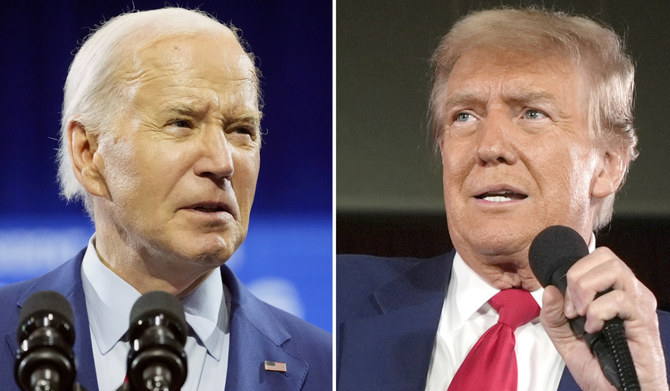
- The “Gestapo” comment came as the campaign has begun heating up, and it follows several other Trump remarks that critics have said are dangerously inflammatory, including calling political rivals “vermin” and comparing immigrants to “animals”
WASHINGTON: Former president Donald Trump has sharpened his allegation that his Democratic successor has weaponized the US justice system against him, comparing Joe Biden’s tactics to those of Hitler’s Gestapo, American media reported Sunday.
The Republican 2024 presidential candidate made the remark during a private meeting Saturday with top party leaders and wealthy donors at his Mar-a-Lago resort in Florida, according to a recording provided to US media by one donor.
In a 90-minute speech, Trump accused the Democrats of “running a Gestapo administration,” referring to the secret police force in Nazi Germany. “It’s the only way they’re going to win,” he said.
The “Gestapo” comment came as the campaign has begun heating up, and it follows several other Trump remarks that critics have said are dangerously inflammatory, including calling political rivals “vermin” and comparing immigrants to “animals.”
His comments in Mar-a-Lago brought loud applause from the audience, which included a number of potential vice presidential picks, according to Politico.
He again lashed out at the prosecutors who have brought four separate court cases against him, including the hush-money trial now taking place in New York.
Trump denounced what he claimed was a “witch hunt” hatched by the Democratic administration to eliminate his key presidential rival.
The White House, which has denied any involvement in the legal cases, denounced Trump’s comments on Sunday.
“Instead of echoing the appalling rhetoric of fascists, lunching with Neo Nazis, and fanning debunked conspiracy theories that have cost brave police officers their lives, President Biden is bringing the American people together around our shared democratic values and the rule of law,” spokesman Andrew Bates said.
Biden’s campaign also responded, saying the Republican’s angry remarks confirmed “what we already knew: Trump’s campaign is about him. His fury, his revenge, his lies, and his retribution.”
Anti-war protesters leave USC after police arrive, while Northeastern ceremony proceeds calmly
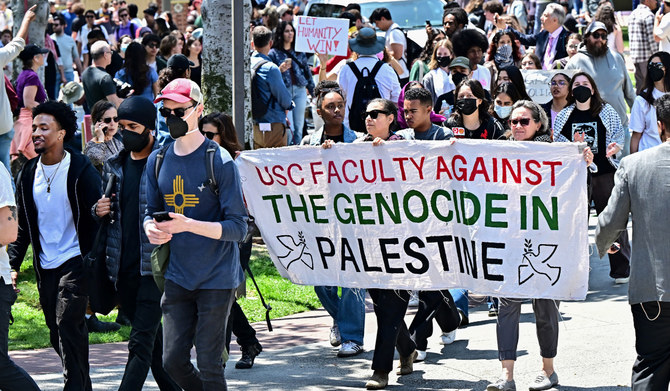
- Israel has killed more than 34,000 Palestinians, according to Gaza’s Health Ministry
WASHINGTON: Students protesting the war in Gaza abandoned their camp at the University of Southern California early Sunday after being surrounded by police and threatened with arrest, while Northeastern University’s commencement began peacefully at Boston’s Fenway Park.
Developments in both places were being watched closely following scores of arrests last month — 94 people at USC in Los Angeles and about 100 at Northeastern in Boston.
Dozens of Los Angeles Police Department officers arrived about 4 a.m. at USC to assist campus safety officers. The university had warned of arrests on social media and in person. Video showed some protesters packing up and leaving, while officers formed lines to push others away from the camp as it emptied out. The university said there were no reports of any arrests.
USC President Carol Folt said it was time to draw a line because “the occupation was spiraling in a dangerous direction” with areas of campus blocked and people being harassed.
“The operation was peaceful,” Folt wrote in an update. “Campus is opening, students are returning to prepare for finals, and commencement set-up is in full swing.”
USC earlier canceled its main graduation ceremony while allowing other commencement activities to continue.
At the Northeastern commencement Sunday, some students waved small Palestinian and Israeli flags, but were outnumbered by those waving the flags of India and the US, among others. Undergraduate student speaker Rebecca Bamidele drew brief cheers when she called for peace in Gaza.
The Associated Press has tallied about 2,500 people arrested at about 50 campuses since April 18, based on its reporting and statements from universities and law enforcement.
Arrests continued apace over the weekend. At the University of Virginia, there were 25 arrests Saturday for trespassing after police clashed with protesters who refused to remove tents. At the Art Institute of Chicago campus, police cleared a pro-Palestinian encampment hours after it was set up Saturday and arrested 68 people, saying they would be charged with criminal trespass.
ARRESTS IN VIRGINIA
In Charlottesville, Virginia, student demonstrators began their protest on a lawn outside the school chapel Tuesday. Video on Saturday showed police in riot gear and holding shields lined up on campus, while protesters chanted “Free Palestine.”
As police moved in, students were pushed to the ground, pulled by their arms and sprayed with a chemical irritant, Laura Goldblatt, an assistant professor who has been helping the demonstrators, told The Washington Post. The university said protesters were told that tents were banned under school policy and were asked to remove them.
Virginia Attorney General Jason Miyares told Fox News on Sunday the police response was justified because students had been warned repeatedly to leave, were violating the school’s conduct code, and that outsiders who were not students provided protesters with supplies like wooden barriers.
“We’ve seen folks that are not students show up in riot gear with bull horns to direct the protesters on how to flank our officers,” Miyares said.
He said some had put bear spray into water bottles and thrown them at officers.
It was the latest clash in weeks of protests and tension at US colleges and universities.
Tent encampments of protesters urging universities to stop doing business with Israel or companies they say support the war in Gaza have spread in a student movement unlike any other this century. Some schools reached agreements with protesters to end the demonstrations and reduce the possibility of disrupting final exams and commencements.
DEMONSTRATIONS AMID COMMENCEMENT
The University of Michigan was among the schools bracing for protests during commencement this weekend, as were Indiana University, Ohio State University and Northeastern. More ceremonies are planned in the coming weeks.
In Ann Arbor, there was a protest at the beginning of the event at Michigan Stadium. About 75 people, many wearing traditional Arabic kaffiyehs along with their graduation caps, marched up the main aisle toward the stage.
They chanted “Regents, regents, you can’t hide! You are funding genocide!” while holding signs, including one that read: “No universities left in Gaza.”
Overhead, planes pulled banners with competing messages. “Divest from Israel now! Free Palestine!” and “We stand with Israel. Jewish lives matter.”
Officials said no one was arrested, and the protest didn’t seriously interrupt the nearly two-hour event, attended by tens of thousands of people, some of them waving Israeli flags.
OTHER PROTESTS CONTINUE
At Indiana University, protesters urged supporters to wear their kaffiyehs and walk out during remarks by school President Pamela Whitten on Saturday evening. The Bloomington campus designated a protest zone outside Memorial Stadium, where the ceremony was held.
At Princeton University in New Jersey, 18 students began a hunger strike to try to push the university to divest from companies tied to Israel. Students at other colleges, including Brown and Yale, launched similar hunger strikes this year before the more recent wave of demonstrations.
The protests stem from the conflict that started Oct. 7 when Hamas militants attacked southern Israel, killing about 1,200 people, mostly civilians, and taking roughly 250 hostages. Vowing to destroy Hamas, Israel launched an offensive in Gaza that has killed more than 34,500 Palestinians, about two-thirds of them women and children, according to the Health Ministry in the Hamas-ruled territory. Israeli strikes have devastated the enclave and displaced most of its inhabitants.
China’s Xi in France for Macron talks on Ukraine
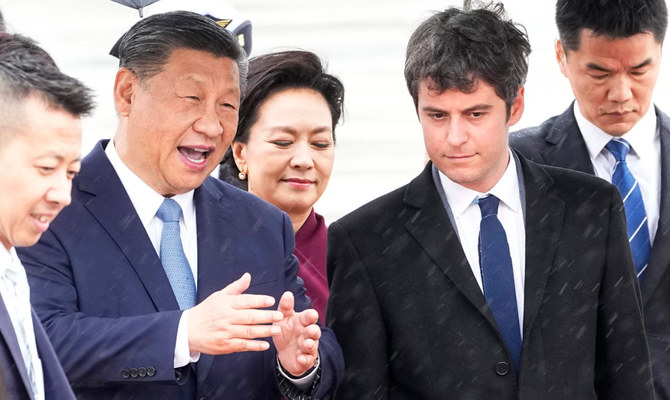
- Tuesday will see Macron take Xi to the Pyrenees mountains to an area he used to visit as a boy for a day of less public talks
PARIS: Chinese President Xi Jinping arrived in France Sunday on a state visit hosted by Emmanuel Macron where the French leader will seek to warn his counterpart against backing Russia in the conflict over Ukraine.
Xi’s arrival for the visit marking 60 years of diplomatic relations between France and China heralded the start of his first trip to Europe since 2019, which will also see him visit Serbia and Hungary.
But Xi’s choice of France as the sole major European power to visit indicates the relative warmth in Sino-French relations since Macron made his own state visit to China in April 2023 and acknowledges the French leader’s stature as an EU powerbroker.
The leader of the one-party Communist state of more than 1.4 billion people, accompanied by his wife Peng Liyuan, was welcomed under umbrellas at a drizzly Paris Orly airport by Prime Minister Gabriel Attal.
Xi is to hold a day of talks in Paris on Monday — also including EU Commission chief Ursula von der Leyen — followed by a state banquet hosted by Macron at the Elysee.
Tuesday will see Macron take Xi to the Pyrenees mountains to an area he used to visit as a boy for a day of less public talks.
In an op-ed for Le Figaro daily, Xi said that he wanted to work with the international community to find ways to solve the conflict sparked by Russia’s invasion of Ukraine, while emphasising that China was “neither a party nor a participant” in the conflict.
“We hope that peace and stability will return quickly to Europe and intend to work with France and the entire international community to find good paths to resolve the crisis,” he wrote.
A key priority of Macron will be to warn Xi of the danger of backing Russia, with Western officials concerned Moscow is already using Chinese machine tools in arms production.
Beijing’s ties with Moscow have, if anything, warmed after the invasion and the West wants China above all not to supply weapons to Russia and risk tipping the balance in the conflict.
“It is in our interest to get China to weigh in on the stability of the international order,” said Macron in an interview with The Economist published on Thursday.
Macron also said in the interview that Europe must defend its “strategic interests” in its economic relations with China, accusing Beijing of not respecting the rules on international trade.
But he acknowledged in an interview with the La Tribune Dimanche newspaper that Europeans are “not unanimous” on the strategy to adopt as “certain actors still see China essentially as a market of opportunities” while it “exports massively” to Europe.
The French president had gladdened Chinese state media and troubled some EU allies after his 2023 visit by declaring that Europe should not be drawn into a “bloc versus bloc” standoff between China and the United States, particularly over democratic, self-ruled Taiwan.
China views the island as part of its territory and has vowed to take it one day, by force if necessary.
Rights groups are urging Macron to bring up human rights in the talks, accusing China of failing to respect the rights of the Uyghur Muslim minority and of keeping dozens of journalists behind bars.
“President Macron should make it clear to Xi Jinping that Beijing’s crimes against humanity come with consequences for China’s relations with France,” said Maya Wang, acting China director at Human Rights Watch.
The group said human rights in China had “severely deteriorated” under Xi’s rule.
A crowd of protesters on Sunday unfurled a Tibetan flag at a demonstration in Paris, accusing Xi of being a “dictator” and wanting to erase local culture in the Tibet region, an AFP reporter said. Paris police put the number of protesters at two thousand.
However analysts are skeptical that Macron will be able to exercise much sway over the Chinese leader, even with the lavish red carpet welcome and a trip to the bracing mountain airs of the Col du Tourmalet over 2,000 meters (6,560 feet) above sea level on Tuesday.
The other two countries chosen by Xi for his tour, Serbia and Hungary, are seen as among the most sympathetic to Moscow in Europe.
“The two core messages from Macron will be on Chinese support to Russia’s military capabilities and Chinese market-distorting practices,” said Janka Oertel, director of the Asia program at the European Council on Foreign Relations.
“However, both messages are unlikely to have a significant impact on Chinese behavior: Xi is not on a mission to repair ties, because from his point of view all is well.”
Niger receives new Russian advisers, equipment
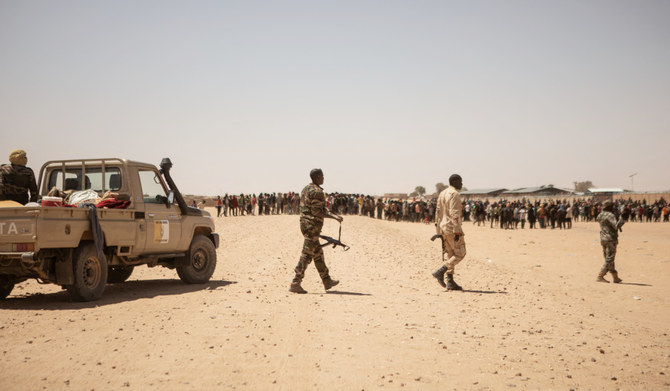
- US Defense Secretary Lloyd Austin indicated on Thursday that Russian troops were now installed at a Nigerien air base near the Niamey airport that also houses US troops
NIAMEY: New Russian military advisers and military equipment have arrived in Niger, according to state television in the African country that wants US forces to leave.
A first set of about 100 Russian advisers arrived in Niger on April 10, along with air defense systems.
Two military transporters arrived on Saturday, according to Tele Sahel that said Russia has now sent three cargo planes of military material and instructors in the past month.
The Africa Corps, seen as the successors of the Wagner paramilitary group in Africa, confirmed the instructors’ arrival in a posting on the group’s Telegram account.
FASTFACT
US Defense Secretary Lloyd Austin indicated that Russian troops were now installed at an air base near the Niamey airport that also houses US troops.
On Saturday, it said more trainers, equipment, and food products had arrived.
US Defense Secretary Lloyd Austin indicated on Thursday that Russian troops were now installed at a Nigerien air base near the Niamey airport that also houses US troops.
Niger’s military regime, which took power in a July 2023 coup, expelled French troops based in the country and then denounced a military cooperation agreement with the US.
It said this had been “unilaterally imposed” by Washington.
Washington agreed in April to withdraw roughly 1,000 soldiers from the country.
Negotiations are underway between the United States and Niger about the withdrawal.
US forces have a key drone base near Agadez, built at a cost of about $100 million.
Niger’s military leaders have moved closer to Russia, as have Mali and Burkina Faso, which also have military coup leaders and are fighting rebel groups affiliated with Al-Qaeda and Daesh.
In April, Idrissa Soumana Maiga, head of the private L’Enqueteur newspaper, was imprisoned after an article mentioned the “presumed” installation of Russian listening devices in official buildings.
Brazil mounts frantic rescue effort as flooding kills at least 78

- The rainfall eased Saturday night but was expected to continue for the next 24-36 hours, with authorities warning of landslides
PORTO ALEGRE, Brazil: Authorities in southern Brazil scrambled Sunday to rescue people from raging floods and mudslides in what has become the region’s largest ever climate catastrophe, with at least 78 dead and 115,000 forced from their homes.
Entire cities were underwater, with thousands of people cut off from the world by the floodwater, brought by days of torrential rains.
In Porto Alegre, the capital of Rio Grande do Sul state, residents stood on rooftops hoping to be rescued as others in canoes or small boats navigated streets that have become rivers.
After what one climatologist called “a disastrous cocktail” of climate change and the El Nino effect, more than 3,000 soldiers, firefighters and other rescuers were trying to reach residents, who were in many cases trapped without basic supplies such as running water or electricity.
Civil defense officials said at least 105 people were missing in the latest of a string of catastrophic weather events to hit the South American giant.
“It looks like a scene out of a war, and after it is over it will require a post-war approach,” Rio Grande do Sul governor Eduardo Leite said, flanked by President Luiz Inacio Lula da Silva and several government ministers.
FASTFACT
The Guaiba River, which flows through the city of 1.4 million people, reached a record high level of 5.09 meters, according to the local municipality, well above the historic peak of 4.76 meters that had stood as a record since devastating 1941 floods.
Lula promised the government would provide all necessary resources for reconstruction.
Besides Porto Alegre, another 341 towns and villages have been hit by the flooding.
Soldiers are setting up field hospitals after hundreds of patients had to be evacuated from regular hospitals, while civilians have also formed volunteer groups to gather basic supplies, including life jackets, water and fuel.
“Everyone helps in their own way, as they can,” said Luis Eduardo da Silva, a 32-year-old volunteer.
The Guaiba River, which flows through the city of 1.4 million people, reached a record high level of 5.3 meters (17.4 feet), according to the local municipality, well above the historic peak of 4.76 meters that had stood as a record since devastating 1941 floods.
“Rio Grande do Sul has always been a meeting point between tropical and polar air masses,” climatologist Francisco Elizeu Aquino told AFP.
“But these interactions intensified with climate change” to create “a disastrous cocktail that makes the atmosphere more unstable and encourages storms.”
Rosana Custodio, a 37-year-old nurse, fled her flooded Porto Alegre home with her husband and three children.
“During the night on Thursday the waters began to rise very quickly,” she told AFP via a WhatsApp message.
“In a hurry, we went out to look for a safer place. But we couldn’t walk... My husband put our two little ones in a kayak and rowed with bamboo. My son and I swam to the end of the street,” she said.
Her family was safe, but “we’ve lost everything we had.”
Authorities scrambled to evacuate swamped neighborhoods as rescue workers used four-wheel-drive vehicles — and even jet skis — to maneuver through waist-deep water in search of the stranded.
Governor Leite said his state, normally one of Brazil’s most prosperous, would need heavy investment to rebuild.
Long lines formed as people tried to board buses, although bus services to and from the city center were canceled.
The Porto Alegre international airport suspended all flights on Friday for an undetermined period, with its runways underwater.
Lula posted a video of a helicopter depositing a soldier atop a house, who then used a brick to pound a hole in the roof and rescue a baby wrapped in a blanket.
The speed of the rising waters unnerved many.
“It’s terrifying because we saw the water rise in an absurd way, it rose at a very high speed,” said Greta Bittencourt, a 32-year-old professional poker player.
Leite said this was the worst natural disaster in the history of Rio Grande do Sul, which is home to agroindustrial production of soy, rice, wheat and corn.
Lula, who visited the state twice in a matter of days, has blamed the disaster on climate change.
South America’s largest country has recently experienced a string of extreme weather events, including a cyclone in September that killed at least 31 people.



